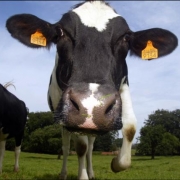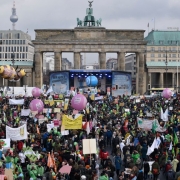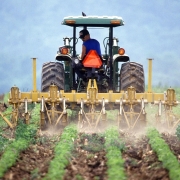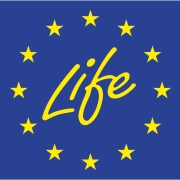MEPs want less EU money going to intensive farming
Lawmakers in the European Parliament’s environment committee have voted for a reduction in subsidies going to intensive farming under the common agricultural policy as of 2021. EURACTIV France reports.
The future common agricultural policy will have to reduce subsidies for intensive farming, the MEPs have said in an opinion on the CAP for the 2021-2017 period.
The reform put forward by the European Commission is to be voted on by MEPs in the agriculture committee on 6 and 7 March, before the European Parliament as a whole then votes on the matter in April.
However, upcoming negotiations with the member states will be delicate and it is increasingly uncertain that the reform will be completed before the May 2019 European elections.
MEPs from the environment committee have, however, adopted recommendations to improve CAP funding for green measures. The MEPs called for 30% of the direct payments budget and 40% of the rural development budget to be devoted to environmental measures.
Animal welfare
MEPs have voted in support of a provision to improve animal welfare. The opinion of the environment committee recommends limiting subsidies granted to livestock farms which exceed a certain “density rate,” calculated as the number of animals reared per hectare.
In practical terms, farmers wishing to remain eligible for all of the EU’s agricultural support will have to have a maximum stocking density of 0.14 hectares per sheep, 0.71 hectares per sow and 1.43 hectares per dairy cow.
In order to encourage farmers to apply a lower concentration of livestock, MEPs pointed to the role of national plans. These will have to provide measures to reduce the density rate of farms.
“Currently, there is no density rate limit for livestock activities within the European Union,” said Marco Contiero from Greenpeace.
“This definition of density rate could distinguish between two options of raising livestock, and allow the one which is more environmentally and animal-friendly to be further subsidised,” he added.
This measure could promote farms that do not confine as many animals as possible into minimal space. However, it is unlikely that the environment committee’s advisory opinion will be followed during the European decision-making process.
Further measures also provide for an improvement in farming conditions. Livestock will have to be able to lie down, to stand, to extend their limbs and to turn over, according to the advisory opinion. Failure to comply with the regulations of the European directive on the treatment of farm animals would lead to certain national subsidies being suspended.
If European regulations are breached, the aid instalment that would be dropped would be those under article 68. This article allows capitals to distribute part of the CAP budget to particular kinds of agriculture. Between 2010-2013, European funds distributed by states under article 68 rose to €6.4 billion.
“So, for farming where animals are confined, it will no longer be possible [for farms] to receive the type of funding provided for by article 68,” Contiero said, welcoming the move.
“These first signs are encouraging but there’s still much to be done to fully tackle the problem of industrial farming,” added Suzanne Dalle, agriculture campaign manager at Greenpeace France.
Concentration of farms
The current European agricultural policy encourages the scaling up of farms and industrial farming, according to a Greenpeace study published on 12 February.
In France, the proportion of pig meat produced by mega-farms increased from 31% in 2004 to 64% in 2016, the Greenpeace study stated. The figure for chicken meat rose from 11% to 28% between 2004 and 2016.
The concentration of milk production in large farms has been less pronounced. In France, this figure rose from 2% to 6%. Greenpeace explains this limited increase with the fact that milk quotas were in place until 2013, which guaranteed a price for producers.
Further animal welfare measures
Animal welfare is also at the centre of a European Parliament resolution adopted on 14 February, which called for transported animals to be better protected.
MEPs not only called for stricter checks and penalties for breaching regulations on animal welfare, but also for transport times to be shortened.
“The intensive farming model, which has been developed for more than 50 years, has led to the concentration of production in certain regions,” said French socialist MEP Éric Andrieu.
“Local abattoirs have been closed down and, in fact, transport times have become longer. We need to return to tighter regional coverage, bringing the slaughter of animals closer to farms and, in addition, developing mobile slaughter facilities, which already exist in some member states,” Andrieu added in a statement.




